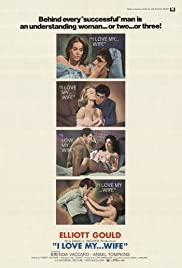
I LOVE MY WIFE
US, 1970, 97 minutes, Colour.
Elliot Could, Brenda Vaccaro, Angel Tompkins.
Directed by Mel Stuart.
I Love My Wife was one of quite a number of Elliot Gould films of 1970 - Bob and Carol and Ted and Alice, Getting Straight, Move, M*A*S*H, Little Murders. Fortunately, he is a convincing actor, likeable, although much the same in each part and yet slightly different.
I Love My Wife has been described as an ideas film that only partially succeeds, and this is probably true. It is episodic but frequently saved by caustic and witty dialogue (often crudely blunt). Marriage has a dubious status today, with partners using the benefit of hindsight to tell us that marriages might have been made in heaven, but are rushed into too frequently on earth because of social pressures, superficial love. We have a number of film analyses of why marriages break up. This is one of those films.
Peter Hall, writing of his excellent analysis of a bad marriage in Three Into Two Won't Go, said that it was a marriage so dishonest that it had to break up. The marriage in I Love My Wife is typical enough and we watch husband and wife contributing over the years to its inevitable collapse. This marriage is going nowhere and the film shows us why and how. Gould acts well, but the main impact comes from Brenda Vaccaro's recognisable suburban wife, loving and dowdy; she is so real, she is frightening. Not a must, but worth seeing.
1. What are the suggestions of the prologue about the U.S. male and the influence of his upbringing?
2. What is the picture of marriage in the first part of the film? Did this marriage have a strong enough foundation? What about the place of children and birth control?
3. How typical was the hero-doctor of the American male - his position, training, reputation, conscience about injustice, yet allowing ambition and flattery to win over conscience?
4. What was the effect of the repeated use of 'home movies'? What did it communicate about the marriage?
5. How typical was the wife - loving, then absorbed with the children, unimaginative, dumpy, slovenly, involved with her mother?
6. Why did the husband look elsewhere? Was it entirely his fault? His wife's? Who was to blame for the situation?
7. Discuss the conscience problems of the two carrying on their affair -love, lies, sense of justice for the injured parties.
8. Why didn't the affair succeed? How did the marriages affect this?
9. How did the wife give herself away when she asked her husband to confess, saying she wouldn't throw a tantrum and then did?
10. What did the film say about people growing older, away from each other, and yet feeling that they are only incompletely fulfilled?
11. What was the effect of the ending? Was it hopeless, cynical, realistic? How valid, allowing for the satire and exaggerations, was the film as a comment on contemporary marriage?